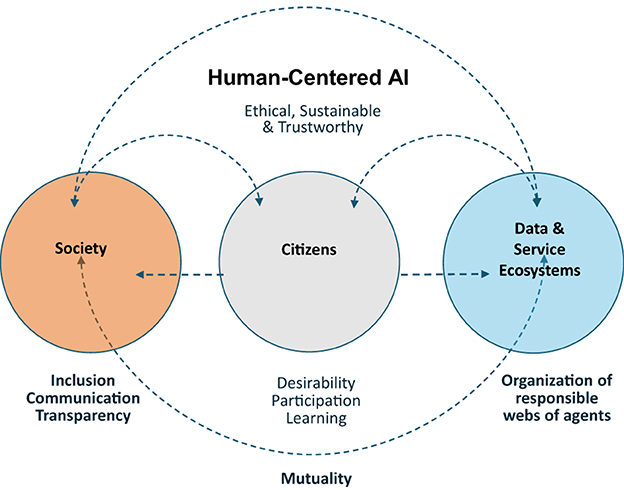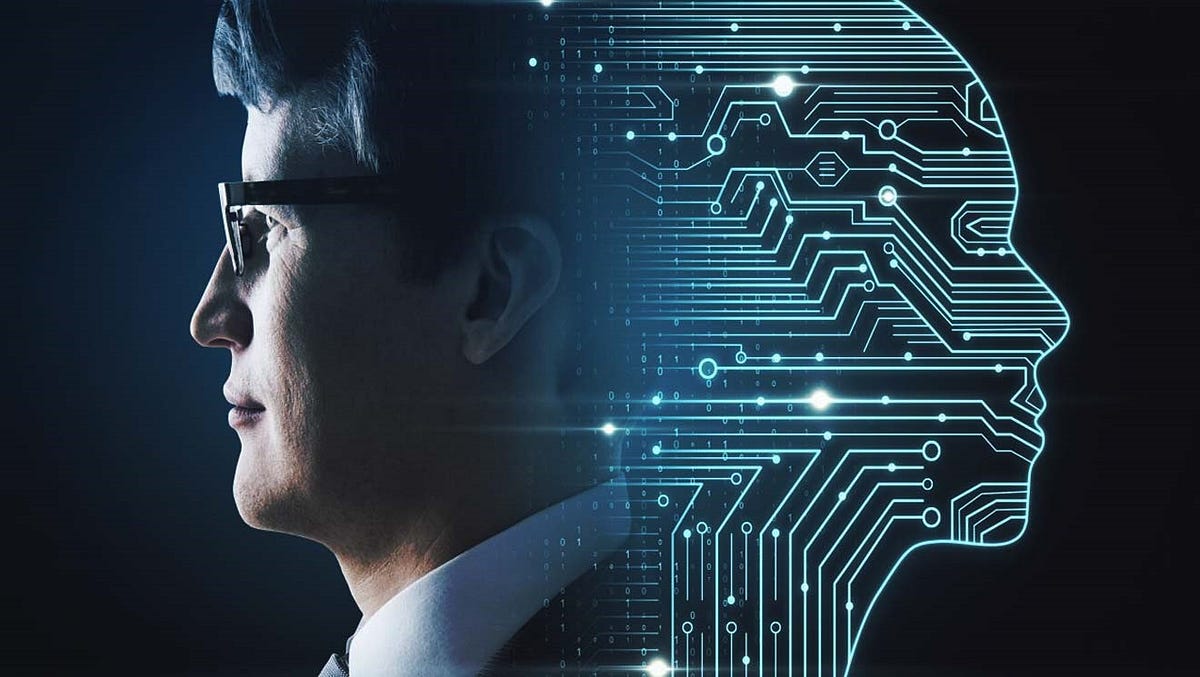Human Centric AI Transformation: Elevating Individual Experience with Intelligent and Compassionate Solutions
Wiki Article
Creating AI for Mankind: Exactly How Human Centric AI Is Shaping the Future of Innovation
In the book "Designing AI for Mankind: Exactly How Human Centric AI Is Shaping the Future of Modern technology," the authors dig into the significance of placing human passions and well-being at the leading edge of AI development. This insightful and expert exploration delves right into the understanding of human-centric AI, honest factors to consider in AI style, the social impact of such systems, as well as the benefits and difficulties connected with implementing them.Understanding Human-Centric AI
Recognizing Human-Centric AI involves analyzing the methods which expert system is created and established with a clear focus on placing human requirements, worths, and honest factors to consider at the center of its layout concepts. This strategy acknowledges that AI innovation is not an end in itself, but instead a device to improve and increase human capabilities. By prioritizing human-centric design, AI systems are developed to be transparent, trustworthy, and liable.
Human-centric AI thinks about the varied requirements and point of views of people and neighborhoods. It intends to deal with problems such as discrimination, prejudice, and privacy issues that might arise from making use of AI. This requires a multidisciplinary technique, entailing experts from different areas such as computer technology, psychology, sociology, and values.
Designing AI with a human-centric emphasis additionally includes taking into consideration the influence of AI on human wellness and culture. This suggests ensuring that AI systems are developed to enhance human autonomy, advertise fairness and inclusivity, and promote basic human civil liberties. It requires a careful equilibrium between technological innovations and honest considerations.
Moreover, human-centric AI acknowledges the value of cooperation between human beings and AI systems. Instead of replacing humans, AI is developed to work along with them, boosting their abilities and supplying assistance in decision-making processes.
Ethical Considerations in AI Design

One of the crucial honest factors to consider in AI design is openness. It is important to make sure that AI systems are transparent and explainable, allowing individuals to understand just how choices are being made. This openness is important in constructing count on in between AI systems and individuals, as well as making sure liability and avoiding potential biases or discrimination.
An additional honest consideration is fairness. AI systems need to be designed to deal with all individuals fairly and without discrimination. Issues such as algorithmic predisposition, where AI systems might accidentally favor specific groups or individuals, need to be resolved and minimized to protect against unjust results.
Privacy and data defense are additionally vital honest factors to consider in AI layout. AI systems often rely on large amounts of data, and it is vital to manage this information sensibly, making sure individuals' personal privacy rights are appreciated and secured.
Additionally, AI design must think about the possible influence on jobs and work. While AI can cause substantial developments, it may likewise cause task displacement and inequalities. Designing AI systems that enhance human capabilities and produce new chances can help attend to these issues.
Social Impact of Human-Centric AI
As we explore the social effect of human-centric AI, it is important to consider exactly how ethical factors to consider in AI layout shape the communication between AI systems and culture. The fostering of AI modern technologies has the prospective to reinvent different aspects of culture, consisting of health care, education and learning, transportation, and interaction. It is essential to make sure that these developments are developed with a human-centric method, taking into account the possible social implications.Among the primary issues concerning AI's social influence is the prospective variation of human employees. As AI systems come to be a lot more capable and innovative of doing intricate jobs, there is an anxiety that lots of jobs will certainly end up being obsolete. This can result in significant socio-economic disturbances, such as joblessness and income inequality. It is important to take into consideration exactly how AI can be utilized to increase human abilities instead than changing them entirely, producing brand-new possibilities for employment and ability development.
An additional social effect of human-centric AI is the possibility for bias and discrimination. AI systems discover from data, and if the data made use of to educate these systems is prejudiced, it can perpetuate and magnify existing social biases. This can bring about unreasonable therapy and discrimination versus particular teams of people, visite site intensifying existing social inequalities. It is important for AI designers to be familiar with these biases and proactively job in the direction of developing formulas that are objective and fair.
Furthermore, the widespread adoption of AI innovations raises problems around privacy and data protection. AI systems usually require accessibility to large amounts of individual information to work successfully. Ensuring that this data is firmly saved and made use of responsibly is necessary to secure individuals' privacy civil liberties. It is required to establish durable laws and frameworks to govern the ethical usage of AI and guard people' individual details.
Advantages of Human-Centric AI Solutions
Human-centric AI systems supply numerous benefits in different fields, including boosted performance, improved decision-making abilities, and customized customer experiences. These systems are developed to prioritize the demands and choices of human beings, ensuring that modern technology acts as a tool to enhance human capacities as opposed to replace them.One considerable benefit of human-centric AI systems is improved performance - human centric ai. By automating ordinary and repetitive jobs, AI can liberate personnels to concentrate on more facility and imaginative ventures. This boosted effectiveness results in greater performance and price savings for businesses across sectors

Individualized user experiences are one more advantage of human-centric AI systems. By comprehending private preferences and actions patterns, AI can customize suggestions, content, and solutions to satisfy the special requirements of each user. This level of personalization not only enhances customer fulfillment however also drives customer loyalty and involvement.
Difficulties in Executing Human-Centric AI
Applying human-centric AI systems presents a number of challenges that have to be addressed to guarantee their successful combination into numerous sectors. Among the major challenges is the moral considerations bordering AI technology. As AI ends up being extra sophisticated and capable of choosing, it is crucial to develop laws and standards to guarantee that AI systems are developed and made use of in an ethical way. This consists of dealing with concerns such as fairness, privacy, and transparency.An additional challenge is the need for durable and trusted information. AI systems depend heavily on information to make precise forecasts and choices. Nonetheless, there can be prejudices and mistakes in the information, which can result in prejudiced or flawed results. It is vital to have top notch and varied data sets to educate AI models successfully and avoid reinforcing existing prejudices.
This lack of openness can hinder trust and approval of AI innovation. Researchers and programmers have to work on creating explainable AI designs that can supply clear descriptions for their decisions.
Lastly, there is a challenge in making certain human-AI partnership. Human-centric AI should intend to augment human abilities instead of change them - human centric ai. It is essential to make AI systems that function in consistency with people and make it possible for effective cooperation. This requires creating straightforward interfaces and offering suitable training to customers to work and comprehend with AI systems properly.
Verdict
In conclusion, the development of human-centric AI has the potential to greatly form the future of technology. By prioritizing ethical factors to consider and comprehending the social effect of AI systems, we can develop AI that benefits mankind. However, there are challenges in applying human-centric AI, such as making certain objective decision-making and attending to privacy concerns. It is critical that we have a peek here continue to browse these challenges and make every effort towards developing AI systems that genuinely offer humankind's benefits.
In the book Visit Website "Designing AI for Humankind: Just How Human Centric AI Is Forming the Future of Innovation," the authors dive right into the relevance of placing human interests and health at the leading edge of AI development.As we delve right into the social impact of human-centric AI, it is important to take into consideration how ethical factors to consider in AI layout form the interaction between AI systems and society. As AI becomes much more innovative and qualified of making decisions, it is essential to establish guidelines and regulations to make sure that AI systems are created and utilized in an honest fashion. It is critical to create AI systems that work in harmony with humans and allow effective partnership. By prioritizing moral considerations and understanding the social influence of AI systems, we can create AI that benefits humankind.
Report this wiki page